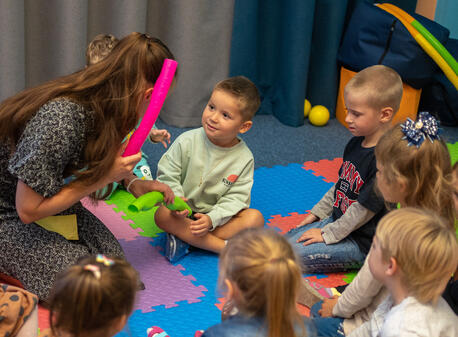
UNICEF Won't Stop Helping Children in Ukraine: Full-Scale War Hits 2-Year Mark
Since the abrupt escalation of war on Feb. 24, 2022, Ukraine’s children and their families have endured displacement, loss and relentless violence. UNICEF continues to deliver critical health, nutrition, protection, water and sanitation and other services and support alongside government relief and recovery efforts. Here is an overview of the response that reached 8.76 million people with humanitarian assistance in 2023 — including nearly 3 million children.
As war in Ukraine reaches grim milestone, a look at UNICEF's impact
Two years of destruction and displacement, violence, separation from family members and friends, loss of loved ones, and disrupted schooling, health care and social services have led to a mental health crisis and a learning crisis among Ukraine’s children.
UNICEF has been part of the humanitarian response to the escalation of war in Ukraine since Day One, scaling up emergency operations alongside partners inside the country and in refugee transit and destination countries.
More than 5.9 million people have fled Ukraine for safety in neighboring host countries and beyond — the largest displacement of people in Europe since World War II — while over 3.7 million people remain internally displaced. Active fighting continues in many of Ukraine's communities in the east and south, with an estimated 2.9 million people living at or near the front lines.
Children continue to suffer under relentless attacks. Since February 2022, 579 children have been killed and 1,284 children have been injured. Thousands of schools, hospitals and homes have been damaged or destroyed, along with critical water and energy infrastructure, putting children’s lives and well-being at risk.
Unexploded ordnance covers close to one-third of the country, making it one of the most heavily mined country in the world.
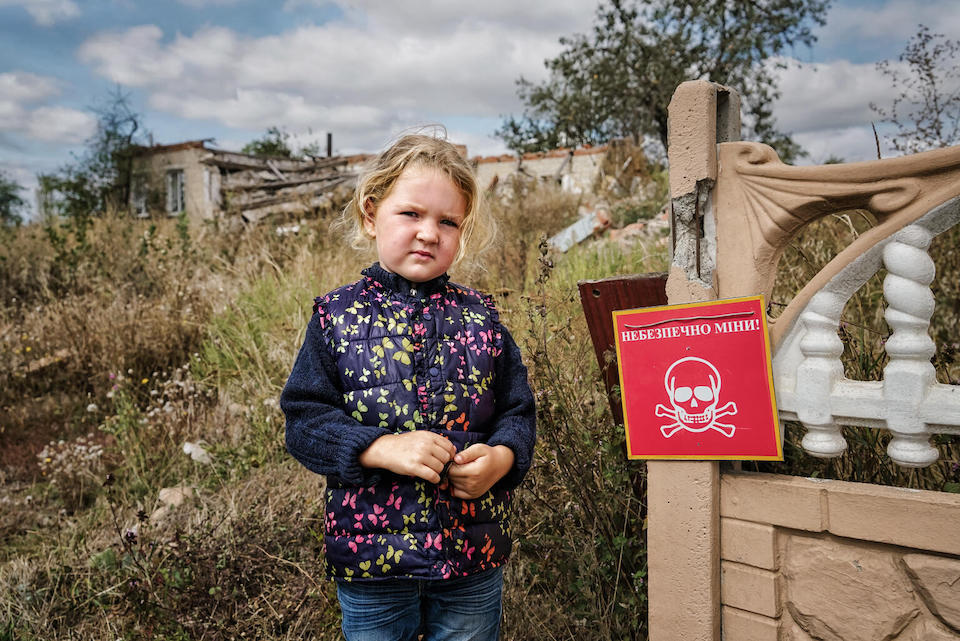
With a presence in Kyiv, Lviv, Odesa, Dnipro, Poltava, Mykolaiv and Kharkiv, UNICEF continues to work alongside partners to meet the need of the most vulnerable children and families, including refugees who have returned home — ensuring their access to health care, immunization, nutrition support, protection, education, safe water and sanitation, social protection and mental health and psychosocial support. UNICEF is also committed to supporting the Ukrainian government in child-focused recovery efforts.
For the children of Ukraine, lifesaving support and protection
In 2023 alone, UNICEF participated in over 100 UN inter-agency relief convoys — a lifeline for hundreds of thousands of people in the most-affected areas. Through these and other interventions, UNICEF reached 8.76 million people last year, including 2.96 million children.
As with any emergency response operation, partnerships — local, regional and national — are critical. UNICEF engages with over 100 government, civil society and service provider partners in Ukraine to respond to critical needs across the country.
Here is a closer look at UNICEF's impact and action plans going forward.
Assisting health workers and hospitals and ensuring access to essential health care
There have been some 1,567 attacks on health care in Ukraine since the escalation of the war, leaving many facilities damaged or destroyed by shelling, and killing and causing serious injuries to health workers and patients — including children. Attacks on health facilities in Ukraine continue to disrupt the availability of health services for children and their families.
During 2023, UNICEF supported access to health care for over 5 million children and women by:
- delivering supplies and equipment to 1,194 health care facilities
- equipping 20 neonatal ambulances with intensive care equipment for use in 16 regions
- rehabilitating shelters in 17 hospitals and perinatal care centers in the regions of Chernihivska, Dnipropetrovska, Odeska, Zaporizka, Zhytomyrska and the city of Kyiv
- introducing home visits by nurses and doctors from close to 180 health facilities to provide personalized care to pregnant women, primary caregivers and children under age 3, along with counseling on immunization, breastfeeding and positive parenting
- providing 70 vehicles to expand health workers' access to families in remote areas
UNICEF continues to support child immunization — a longtime priority for UNICEF's mission in Ukraine, even before the escalation of war disrupted routine services. UNICEF procures large quantities of vaccine doses to support both routine and emergency vaccination drives all around the world — Ukraine included — to protect children from measles and other preventable diseases. In Ukraine, UNICEF is helping to expand the reach of local and national campaigns through mobile health teams.
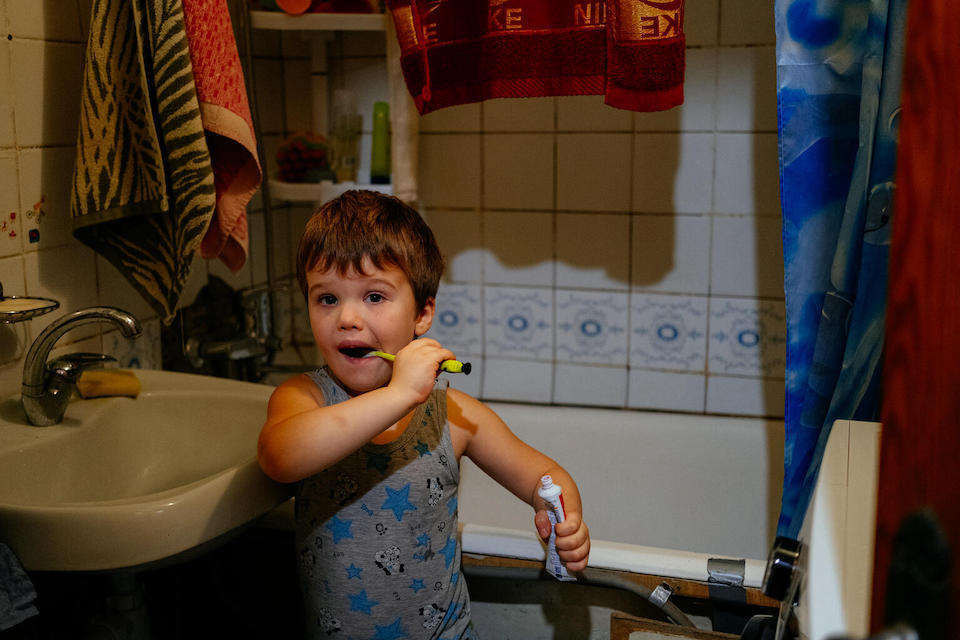
Providing safe water and sanitation — a critical part of UNICEF's emergency response in Ukraine
Even before conflict in Ukraine escalated in February 2022, 10 million Ukrainians, including 1.7 million children, lacked access to safe water and 20 million people, including 3.4 million children, had no access to centralized wastewater facilities due to aging infrastructure, underinvestment and poor governance. Many networks were in critical condition and many treatment facilities needed upgrades.
Then the war made everything worse. Ukraine's water and sanitation sector has sustained some $2.2 billion worth of damage, pushing systems toward collapse.
In the past two years, UNICEF, a longtime leader in this area, ensured safe access to water, sanitation and hygiene (WASH) for 5.4 million people across 112 communities, including over 910,000 children, by focusing on repairing and rehabilitating water and sanitation networks together with 65 water utility companies in 16 regions.
UNICEF achieved these results by:
- delivering 316,300 pieces of equipment such as valves, pipes, generators and welding machines to restore and maintain WASH services
- delivering 690,000 tons of water treatment chemicals to 11 water utilities
- drilling five boreholes on the premises of four hospitals in Odeska and one in Mykolaivska, benefiting 90,000 people
- supporting WASH at 394 schools
- providing WASH supplies including bottled water, water trucking, water purification tablets, water tanks and hygiene kits to more than 2 million people, including over 338,000 children mainly in frontline areas
Local civil society partners have been critical for last-mile distribution, especially for populations staying behind or returning to newly accessible municipalities close to the front lines.
UNICEF continues to help rehabilitate damaged systems, including in areas affected by the Kakhovka Dam collapse last June, and to provide water treatment chemicals and hygiene supplies. In 2024, UNICEF is aiming to reach nearly 4.5 million people in Ukraine with access to sufficient quantities of safe water. UNICEF is also playing a coordinating role among multiple partners involved in the country's recovery, with a focus on building WASH systems back better.
War’s heavy toll on children’s mental state, learning and development
Supporting children's mental health and well-being and their access to education go hand in hand. Both are top priorities for UNICEF in all emergencies, and the war in Ukraine is no different.
UNICEF estimates that over the past two years, children in frontline areas have been forced to spend between 3,800 and 4,500 hours sheltering in basements as air raid alerts sound above. They have experienced prolonged disruptions to their schooling and to their daily routines, sparking a deep sense of loss, dread, fear and anxiety.
These feelings, coupled with isolation, manifest in ways that make it challenging for children to feel happiness, learn and participate in everyday life.
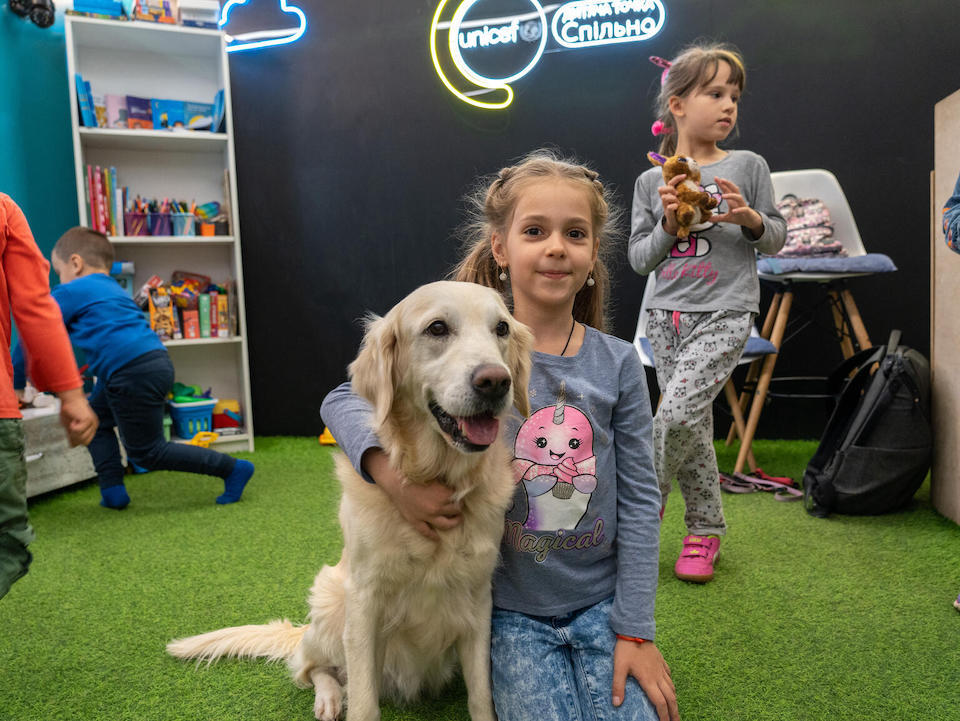
The winter months have been particularly horrific for children, with thousands sheltering in cold, damp basements as an escalation of attacks left many families without heating, access to water or electricity.
In surveys, parents across Ukraine have reported elevated levels of anxiety, excessive fear, phobias and sadness, decreased engagement in school, sensitivity to loud noises and sleep troubles among children. Half of 13- to 15-year-olds have trouble sleeping, and 1 in 5 have intrusive thoughts and flashbacks — typical manifestations of post-traumatic stress disorder.
Meanwhile, many Ukrainian children living as refugees are facing the prospect of long-term displacement.
“The war in Ukraine has shattered childhoods,” UNICEF Executive Director Catherine Russell said. “Children ... need this nightmare to end.”
The war in Ukraine has shattered childhoods. Children ... need this nightmare to end. — UNICEF Executive Director Catherine Russell
UNICEF reached 2.5 million children and caregivers inside Ukraine — and another 1.3 million children and caregivers in countries hosting refugees — with mental health and psychosocial support (MHPSS) interventions in 2023.
Inside Ukraine, these results reflect the work of 113 multi-disciplinary UNICEF-supported mobile teams. By the end of 2023, UNICEF had downsized these teams, shifting toward capacity building among local professionals and service providers as a longer-term solution to meeting mental health needs. UNICEF and partners trained more than 38,000 professionals in Ukraine on the provision of high-quality MHPSS in 2023.
UNICEF continues to support over 200 Spilno Child Spots, child-friendly spaces across Ukraine that offer services and activities for children and caregivers — including mental health and psychosocial support. The centers reported 2.5 million visits in 2023, including 1.5 million visits by children.
Just as critical as supporting children's mental health: ensuring access to education
The war's impact on children's education remains a major concern. Across the country, 40 percent of Ukraine’s children have not been able to attend school consistently. In frontline areas, half of all school-age children are out of school; over 2,300 damaged or destroyed primary and secondary schools remain closed for safety reasons, leaving nearly 2 million students dependent on at least some online learning.
"Education is a pillar of hope, opportunity and stability in children’s lives, but it continues to be disrupted or out of reach for millions of Ukraine’s children," Russell said.
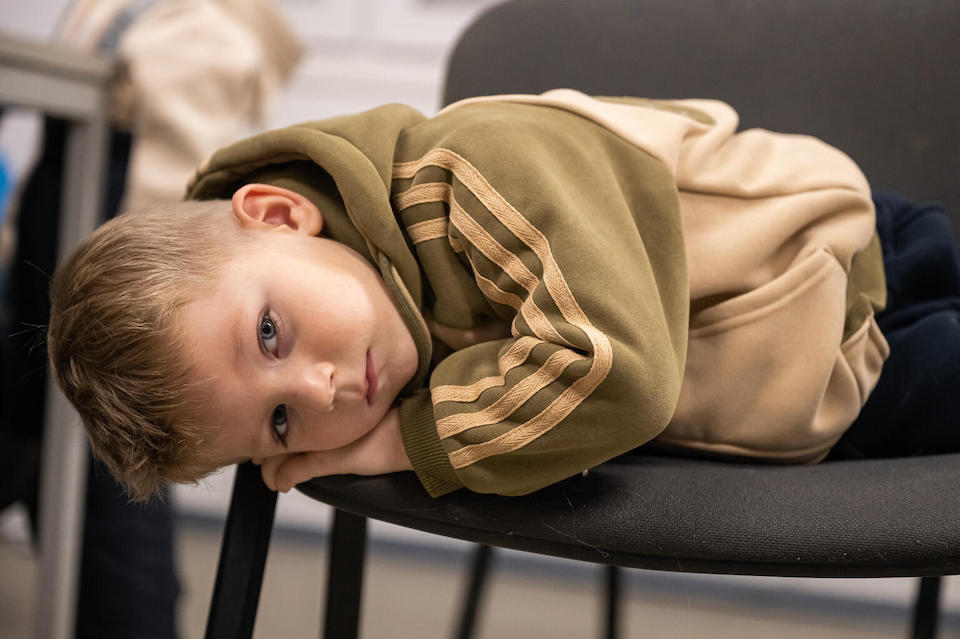
The result: further deterioration of children's mental state and in their learning outcomes. The latest data show a two-year learning loss in reading and a one-year loss in math, on average, among Ukraine's children.
UNICEF works to counter these effects for as many children as possible. In 2023, UNICEF helped more than 1.45 million children inside Ukraine access education, including early learning, in both formal and non-formal settings, and helped 1.26 million refugee children access education in host countries.
This support included helping to improve the All-Ukrainian School Online platform, and distributing laptops and opening digital learning centers to increase access for more students.
To further support children's education in Ukraine in 2023, UNICEF also:
- completed the rehabilitation of 65 education facilities, benefitting 35,000 children
- disbursed cash grants to 968 hub schools, which most use to pay for teaching materials and building repairs
- distributing school supplies to over 684,000 children
Supporting efforts toward inclusive education is a related goal. UNICEF has contributed to the development of a new national strategy and action plan for ensuring child-friendly and inclusive learning environments and is helping to foster greater cooperation among schools, inclusive resource centers and local governments to ensure the promotion of quality education for every child. UNICEF also supported training sessions on inclusive education for over 5,000 teachers.
For adolescents and young people, UNICEF has scaled up its UPSHIFT life skills development program, reaching thousands. UNICEF has also provided capacity building and seed funding for the establishment of dozens of youth centers to help increase young people's participation in their communities, strengthen peer-to-peer support and support youth-led initiatives.
Protection programs focus on gender-based violence, landmines
Gender-based violence (GBV) continues to be a major concern, amid reports that incidents have increased since war escalated two years ago.
In 2023, UNICEF reached 1.1 million girls, boys and women who have survived or at risk of GBV — including over 7,500 children with disabilities — with gender-based violence prevention, risk mitigation and response services. Interventions range from mental health and psychosocial support to case management and referrals, first aid and medical consultations, recreational activities and the distribution of dignity kits.
UNICEF also launched the online platform Laaha, where young women and girls can access sexual and reproductive health information, early signs of violence and information on services and referrals. An online course on GBV core concepts and safe referrals was developed in Ukrainian to help frontline humanitarian workers better support GBV survivors and mitigate risks; over 7,100 people have completed the course.
Other protection interventions focus on landmine safety. More than 1 million children and over 343,000 caregivers participated in UNICEF-supported mine risk education programs — implemented in partnership with over 5,500 educators, social workers and NGO staff — in 2023.
UNICEF equipped 15 mobile safety class vehicles to further facilitate the programs across 10 regions. And after the Kakhovka Dam was destroyed, UNICEF swiftly launched a campaign addressing the new threat of floating mines, reaching 1 million people.
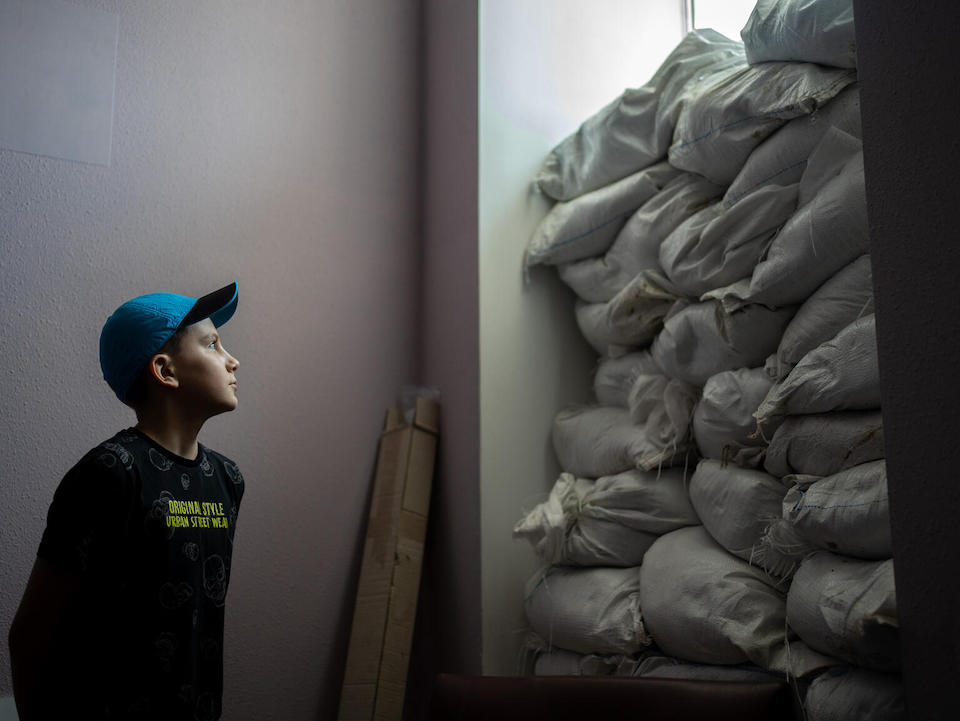
Emergency cash support combined with longer-term system strengthening efforts to support a child-centered recovery
The war in Ukraine more than quadrupled the country's poverty rate, pushing 7.1 million people into poverty and reversing 15 years of economic progress. Families with three or more children have been disproportionately affected, with 85 percent of such families now living in poverty, according to UNICEF.
As part of its emergency assistance efforts, UNICEF provided nearly 62,000 households with humanitarian cash transfers, which families spent on children’s clothes and shoes, food and hygiene items.
For longer-term impact, UNICEF is also involved in helping the government build better systems of social protection for the most vulnerable children and families going into — and lasting beyond — the recovery period.
A new Better Care initiative, for example, is focusing on strengthening families to prevent separation and increasing access to family-based care for all children. This includes access to a minimum package of social services, including individual case management, day care, early intervention and psychosocial support. UNICEF helped establish a new Coordination Center that is now developing a national strategy for ensuring the right of every child in Ukraine to grow up in a family environment and a national action plan for implementing that strategy.
With donor support, UNICEF can do more in 2024
Danger and uncertainty remain a part of daily life in Ukraine. UNICEF won't stop working to help children whose lives have been upended by the war, and whose lives and futures remain under threat.
UNICEF will continue to participate in the multi-agency aid convoys and building capacities among service providers and partners in education and child protection. UNICEF will continue to advocate for unimpeded humanitarian access to facilitate the delivery of humanitarian assistance and for a sustainable recovery to support the realization of children’s rights.
And in refugee-hosting countries, UNICEF will continue to support individual case management and cash assistance programs, inclusive education and social protection initiatives and gender-based violence prevention and response, while also helping to facilitate the handover of such programs to national governments.
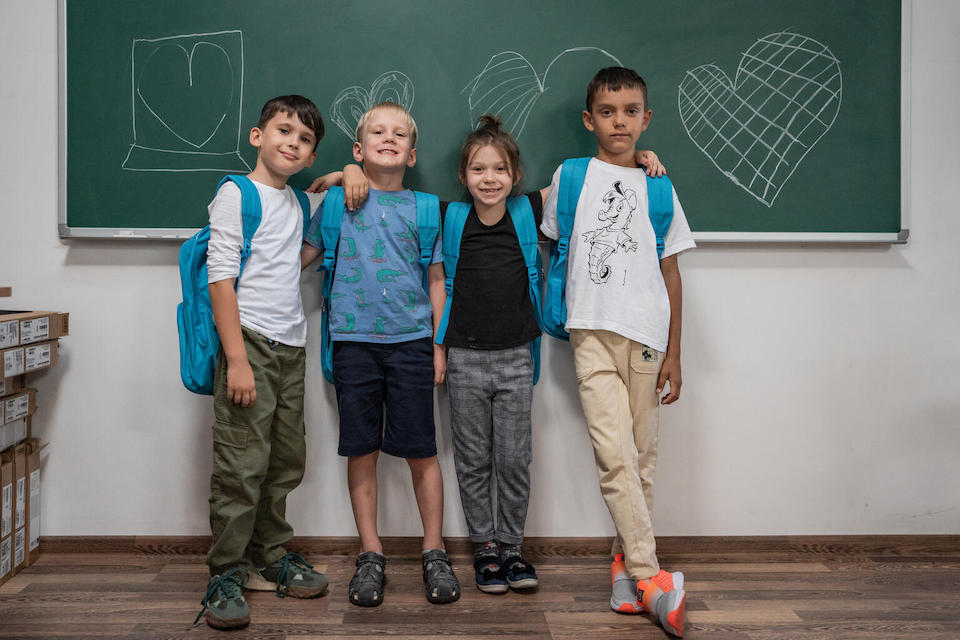
“Humanitarian principles, international humanitarian law and international human rights law must be respected," UNICEF Executive Director Catherine Russell said. "Children need a chance to recover, and the best way to do that is by ending this war."
None of this work would be possible without support from donors including private sector and civil society partners. Learn more.
Flexible funding allows UNICEF to remain in Ukraine and neighboring countries and adapt its response to efficiently meet children's needs. Your tax-deductible contribution can make a difference. Donate today.
Join UNICEF USA in urging Congress to provide $9.2 billion in emergency humanitarian aid for children in need. Act now.
Learn more about what it's like to be a child in Ukraine right now.
HOW TO HELP
There are many ways to make a difference
War, famine, poverty, natural disasters — threats to the world's children keep coming. But UNICEF won't stop working to keep children healthy and safe.
UNICEF works in over 190 countries and territories — more places than any other children's organization. UNICEF has the world's largest humanitarian warehouse and, when disaster strikes, can get supplies almost anywhere within 72 hours. Constantly innovating, always advocating for a better world for children, UNICEF works to ensure that every child can grow up healthy, educated, protected and respected.
Would you like to help give all children the opportunity to reach their full potential? There are many ways to get involved.





